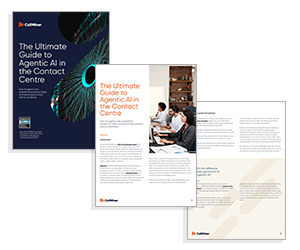Our panel of experts share their top tips for helping your team to overcome COVID-fatigue in the contact centre.
Focus on the Future (With Remote Vision Boards!)

While very few of us expected COVID-19 to stick around into 2021, we all expect and agree that there WILL be a future without quarantining and social distancing (though masks and excessive handwashing may be here to stay!).
Don’t lose sight of this! Help keep your advisors positive and engaged by keeping them focused on the future.
One way to do that is via 2021 vision boards. Schedule off-phone time for advisors to create a vision board, cutting out pictures of places they want to go and things they want to achieve in 2021. Then devote part of your next staff meeting for each person to share their vision board.
While this may seem childish, the exercise will help clear advisors’ minds, get them focused on the future, and provide a way for your team to learn a bit more about each other.
Contributed by: Lauren Comer at NICE InContact
Run Remote Competitions and Games

It’s vital to maintain morale and team cohesion, especially at a time when many people who never wanted to work-from-home in the first place are struggling with discipline, motivation, productivity and isolation.
So get creative!
As a contact centre company that’s been homeworking for 16 years, we find that working in the virtual world is much easier when teams come together – even if people are living hundreds of miles apart.
We run virtual games nights and a variety of other social activities from film nights to quiz nights, Catchphrase, bingo and scavenger hunts. Our advisers get the opportunity to mix with all their colleagues and bring other family members along too.
In addition, we run competitions during work time to bring people together, and promote social chat between frontline advisors.
Providing health and well being support is absolutely critical and within our LiveDesk “Digital Workplace” we have an innovative Engagement Tracker that shows who is and isn’t being proactive. If the Tracker identifies an issue of concern, it can lead to a welfare check.
Contributed by: Mark Walton at Sensée
Consider Split, Micro and Respite Shifts
The link between employee engagement and schedule flexibility is often understated.
In fact, you may be surprised by the uplift in advisor engagement that can come from encouraging supervisors to be creative with shift planning.
For example, split shifts are good for teaching and, if time is of the essence, micro-shifts offer 1-hour windows to minimize stress while maximizing performance.
Another interesting idea is “respite shifts”. When customer conversations become challenging, these shifts can work wonders in taking the pressure off advisors.
Or, because background noise is a common issue in the home environment, consider using micro-shifts to switch advisors from voice calls to digital channels like Chat to combat fatigue.
There are lots of ideas out there for you to consider!
Nurture Self-Sufficiency
It’s not enough for advisors to deliver excellent customer service across multiple channels. Today’s homeworking advisors have to add self-sufficiency to their repertoire.
However, the pressure to be everything to everyone, especially when cut off from their usual support network of colleagues, managers and the IT department, is often exhausting and demoralizing.
Activities that will smooth the path to self-sufficiency and help advisors avoid COVID-burnout may include:
- Communicating a clear service vision
- Demonstrating your trust in your team
- Showing appreciation for individual efforts
These are all great, and another, longer-term, idea involves introducing the latest intraday self-scheduling technology.
With a few swipes of a smartphone, frontline staff are able to move break times or lunches to accommodate sudden domestic emergencies.
When advisors take control of their new homeworking environment, their mood lifts and they feel energized. It’s contagious.
Make Friday the New Monday

It is clear that homeworking is here to stay, meaning we now live at work rather than work from home. As a result, the boundaries between working time and home time are blurred and advisor burnout is rife. It’s time to develop an effective coping strategy.
As always, good communication is critical, so continue with regular virtual meetings to keep advisors connected, but do things differently.
Rather than leave advisors to dwell on negative customer conversations or fears of an uncertain future over the weekend, why not hold team meetings on a Friday afternoon?
Give advisors the opportunity to share one success, one lesson learned, one source of frustration and one big concern with the rest of the team. It works both ways so encourage managers to give honest answers in return.
By making Friday the new Monday, advisors can enjoy their weekend and start the week ahead with greater clarity and renewed energy.
Contributed by: Ed Creasey at Calabrio
Get People Moving

Whether it’s a twenty-minute walk at lunchtime, a virtual team yoga class or agreeing with colleagues to do 5km of exercise a day, getting moving and breathing fresh air is good for everyone.
Managers should encourage employees to take more regular breaks to include exercise in their day, especially during the shortened daylight hours of winter, which can negatively affect a lot of people.
From a mental health perspective as well, with homeworking still widespread, going for a walk at the end of the day is a great way to separate work from home life and to clear your head, leaving emails and negative news stories behind.
We all know the benefits of exercising and that it boosts positivity – and happy employees are hardworking employees.
Contributed by: Craig Farley at IP Integration
Gamify the Contact Centre

With a gamification module incorporated into your workforce management system, advisors can be positioned as players of a game – which can brighten up their day no end.
The system that the game is based on rewards performance (by awarding gold, silver, and bronze medals), based on pre-determined parameters and metrics.
Some examples of metrics being used may be number of handled calls, adherence, and pre-set targets. These medals can then be traded in for prizes, e.g. being first in line for the next shift bid.
Even if you do not currently have a workforce management system, why not consider incorporating gamification anyway with a tally chart of adherence? It can be a great way to incentivize agents and boost morale and productivity!
Contributed by: Neil Draycott at Business Systems
Simplify Long, Monotonous Processes

Fatigue can be partially resolved by not wasting time on manual, tedious, time-intensive tasks.
Adding to this, many advisors now feel like they are working from home as isolated individuals rather than as a team. They are experiencing “silo fatigue”, due to the increased time and effort it’s taking to get queries processed and handled, in part thanks to a lack of collaboration.
Many contact centres are looking for ways to navigate around silos and streamline remote support processes, turning to technology that can automate or mitigate manual tasks, enable teamwork and improve the customer interactions.
Technologies such as transcription, conversational AI and digital whiteboarding or annotation can augment and simplify the communication experience for brands when connecting with customers.
Contributed by: Andy Bird at Lifesize
Stop Customers From Transferring Negative Energies to Advisors

On the customer service frontlines, agents are customers’ first human contact and brands’ last line of defence.
The frustrations customers feel can transfer to agents, and with the volume of interactions increasing during COVID-19, many agents have been pushed to their limits. Their fatigue is a reflection of customer disappointment.
Brands can fix this problem by:
- Managing customer expectations
- Deploying tailor-made strategies based on channel, issue and customer
- Operationalizing data
On this last point, contact centres can then aim to leverage data in the hope of further personalizing customer interactions. That way, supporting customers can be done conveniently, efficiently and effectively.
Contributed by: Neil Titcomb at Odigo
Keep Up Your Video Shenanigans

The social element can be vital in creating a positive working experience for call centre representatives, including chatting across desks, having ad hoc meetings, sharing ideas and building team camaraderie.
Now that teams are working remotely, call centre managers need to ensure teams continue to feel connected and supported, which will in turn positively impact their well-being and motivation.
Video-conferencing is ideal for bringing dispersed teams together and creating virtual watercooler moments, like coffee mornings, get-togethers or sharing sessions.
Many contact centres ran lots of these at the start of the COVID-19 outbreak and it’s important, for your team’s engagement and well-being, that they don’t fall by the wayside.
Contributed by: Richard Kenny at Poly
Make Feedback More Timely

Advisors whose performance may be suffering due to COVID-fatigue may need more than just post-call feedback. They would prefer real-time feedback and guidance in the moment to help them do their jobs more successfully and deliver the best customer experience possible.
When advisors feel supported in every facet of their job, even making some customer interactions easier, organizations can not only combat COVID-fatigue, but even improve performance.
Contributed by: Frank Sherlock at CallMiner
Get Your Staffing Levels Right

Contact centre teams are experiencing more stress than ever before. The pandemic has put added pressure on them, with advisors often being the first port of call for many anxious customers.
Rising call volumes also bring their own challenges of working from home, causing service levels to falter, which also negatively impacts motivation levels and well-being.
Getting staffing levels has therefore never been so important!
Reporting tools and technology can identify peak times within the contact centre, even when advisors are working from home, enabling managers to have the right number of staff on at the right times.
Contributed by: Nick Riggott at Mitel
Update Your Clunky Security Practices

With agents under more pressure to deliver their advice and services than ever before, biometric technologies could play a key role in easing the load.
Not only can these technologies verify and authenticate a caller using just the sound of their voice and behavioural characteristics – saving advisors from having to ask knowledge-based questions – they can also flag known fraudsters who are attempting to deceive.
Businesses can combine voice biometrics with natural language understanding (NLU) in order to authenticate an individual based purely on natural utterances. This means any interaction can be secured and personalized from the moment a person starts speaking.
Contributed by: Brett Beranek at Nuance
For more from our panel of experts, why not check out some of the following popular articles:
- 15 Contact Centre Homeworking Problems and How to Overcome Them
- 30 Contact Centre Predictions for 2021
- 16 Contact Centre Innovations That You Can’t Ignore
If you are looking for ideas to better look after the wellbeing of your team, who may be suffering from COVID-Fatigue, check out the following episode of The Contact Centre Podcast, which features wellbeing expert Helen Ginman:
The Contact Centre Podcast – Episode 32:
Employee Wellbeing: Take Care Of Your Team!
For more information on this podcast visit Podcast: Employee Wellbeing: Take Care of Your Team!
Author: Charlie Mitchell
Reviewed by: Jo Robinson
Published On: 6th Jan 2021 - Last modified: 13th Jan 2026
Read more about - Call Centre Management, Brett Beranek, Business Systems, Calabrio, CallMiner, Coronavirus, Craig Farley, Ed Creasey, Editor's Picks, Employee Engagement, Frank Sherlock, Health Wellbeing and Stress, IP Integration, Lauren Comer, Lifesize, Management Strategies, Mark Walton, Mitel, Motivation, Neil Draycott, Neil Titcomb, NiCE CXone, Nuance, Odigo, Poly, Remote Working (Homeworking), Richard Kenny, Sensee


















